
NATIONAL CONCERT HALL 2024 — 2025 SEASON
National Concert Hall presents


NATIONAL CONCERT HALL 2024 — 2025 SEASON
National Concert Hall presents
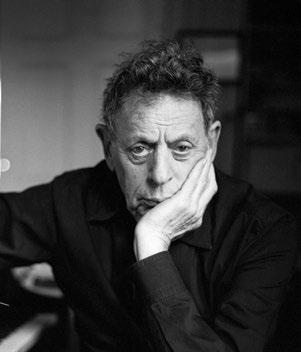
Philip Glass Ensemble
Philip Glass Glassworks
Philip Glass Excerpts from Satyagraha , Akhnaten and The Photographer
THURSDAY 10 OCTOBER 2024, 8PM
In the first of two concerts dedicated to the music of legend in his lifetime, Philip Glass, the Philip Glass Ensemble showcase his dazzling display of minimalism turned up to the max, in Glassworks , and from three of his mesmeric, ground-breaking operas.
Tickets from €15 Book now on nch.ie
National Symphony Orchestra
Philip Glass Ensemble
Michael Riesman conductor
Kate Ellis cello
Philip Glass Naqoyqatsi
Irish Premiere. Co-commissioned by Los Angeles Philharmonic, Barbican, London, Edinburgh Festival and the National Concert Hall.
FRIDAY 11 OCTOBER 2024, 7.30PM
A major event. The Philip Glass Ensemble and close Philip Glass associate Michael Riesman partner with the NSO for the Irish premiere of a compelling new orchestral score from Glass’s stunning soundtrack for Geoffrey Reggio’s 2002 film, Naqoyqatsi (‘life as war’).
National Symphony Orchestra
Ryan McAdams conductor
Elaine Clark violin
Friday 20 September 2024, 7.30pm
National Concert Hall
Presented by Paul Herriott, RTÉ lyric fm Programme
Philip Glass
Violin Concerto No. 1 / 25’ John Luther Adams Become Ocean / 25’
Broadcast live on RTÉ lyric Live on RTÉ lyric fm
PLEASE NOTE: The NCH does not permit photography or videography during the performance (without prior permission). We kindly ask you to refrain from using any recording equipment for the duration of tonight’s performance.
NCH Board Members
Maura McGrath Chair | James Cavanagh | Cliona Doris
Rebecca Gageby | Hilary Hough | Peter McKenna | Niamh Murray
Michelle O’Sullivan | John Reynolds | Don Thornhill
Patron
Michael D. Higgins President of Ireland


Welcome to the National Concert Hall’s Culture Night celebration with the National Symphony Orchestra. On an evening which offers so much choice culturally, we are delighted that you have chosen to spend this time with us.
Culture Night is an evening to try something different. This evening it is our pleasure to present music by two very different living American musical giants. The First Violin Concerto by Philip Glass is a loving remembrance of his father, a major work as moving as it is modern with Elaine Clark, the NSO’s Leader, as soloist. John Luther Adams describes Become Ocean as ‘a meditation on the vast, deep and mysterious tides of existence’. It is one of a number of works this season inspired by the environment and the natural world. Other works range from Haydn’s The Creation and Beethoven’s Pastoral Symphony to contemporary works including Stephen McNeff’s The Celestial Stranger and Ailís Ní Ríain’s The Land Grows Weary of its Own.
The 2024-2025 Season comprises more than 60+ concerts and features some of the world’s most exciting and dynamic soloists, conductors and ensembles as well as our own NSO, new works by new voices and a series of concerts with our new Artists-in-Residence: composer and musician Bryce Dessner, opera singer Tara Erraught, and musician and presenter Jessie Grimes.
We hope you enjoy your evening and we hope to see you soon again. You are always welcome at the National Concert Hall.
Robert Read CEO

Maura McGrath Chairperson
I am delighted to be performing in this year’s Culture Night celebration at the National Concert Hall. There is always such a buzz around Dublin on this night as the country comes together to showcase and celebrate our rich cultural heritage.
I performed Prokofiev’s Violin Concerto No. 1 with the National Symphony Orchestra on Culture Night in 2009, so it is a thrill to be bringing Philip Glass’s Violin Concerto No. 1 to the National Concert Hall tonight. I have enjoyed and admired the music of Philip Glass for many years through his symphonies and string quartets but this is my first time performing this work. Rather than an overtly virtuosic solo part, the violin is part of the ensemble, creating texture and pulsating rhythm.
A powerful and captivating work, it is an ideal partner to Become Ocean by John Luther Adams. Glass composed it for his father who was a great lover of violin concerts. ‘Written to be liked,’ Glass wrote. ‘And it is. It’s for my Dad.’ The second movement is a hauntingly beautiful meditation, incidentally chosen by Jamie Dornan as one of his Desert Island Discs on BBC Radio 4!
It is an honour to perform as soloist with my friends and colleagues in the National Symphony Orchestra; they are an incredibly special group of musicians and extremely supportive. I’m looking forward to working with Ryan McAdams for the first time and hope you enjoy the performance.
Elaine Clark
Philip Glass (b.1937)
Violin Concerto No. 1
With a commission from the American Composers Orchestra – his first from an American orchestra – Philip Glass composed the Violin Concerto. Though the actual writing took some four months (November 1986 to February 1987), Glass says ideas were germinating for a time before writing commenced. The Concerto is dedicated to Dennis Russell Davies and Paul Zukofsky, who presented the first performance. The orchestral accompaniment consists of two flutes (one doubling as piccolo), two oboes, E-flat clarinet, two clarinets and bass clarinet, two bassoons, four horns, three trumpets, three trombones, tuba, timpani, percussion (snare drum, bass drum, triangle, cymbal, woodblock) harp, and strings.
‘The search for the unique can lead to strange places. Taboos – the things we’re not supposed to do – are often the most interesting. In my case, musical materials are found among ordinary things, such as sequences and cadences. All that I threw out in 1965 I’ve gradually brought in again, making it my own.’
It is certainly news that Philip Glass – whose career has been most closely associated with opera, film theatre, dance, and his own Philip Glass Ensemble –has written his first orchestral work since his student days. What is perhaps most newsworthy is that, in choosing to write a violin concerto, he has not only taken on one of the most enduring genres in Western art music, but he has cast it in most familiar terms. Glass’s new concerto falls in the three-movement structure common to the vast majority of concertos written in the last three centuries, and is scored for an orchestra of conventional size and configuration. ‘I like the normal orchestra,’ comments Glass, whose operas also use orchestras of similar size. ‘I have an alternative electronic medium which is my Ensemble. By writing for both there’s a balance in my activities.’
Familiar, too, are the opening chugging chords, the solo violin’s first arpeggios, and the repetitive patterns that cause time to be absorbed into large units rather than to be divided up: the Concerto is instantly identifiable as a work
by Philip Glass. ‘This piece explores what an orchestra can do for me. In it, I’m more interested in my own sound than in the capability of particular orchestra instruments. It is tailored to my musical needs.’ Familiarity also plays a part in Glass’s confidence in having those needs realised: Dennis Russell Davies has conducted the opera Akhnaten numerous times and his advocacy of Glass’s music has done much to widen the understanding of Glass’s style among performers from Stuttgart to the Philadelphia Orchestra. In addition, Glass knows many of the ACO’s members personally; they in turn have followed his career closely.
Of course, Glass is quick to point out, a concerto is not a purely orchestral composition: ‘It’s more theatrical and more personal.’ And even if this particular concerto is less theatrical than some 19th century concertos in which, as Glass put it in a 1981 interview, ‘the solo instrument becomes more and more the alter ego of the composer. And the listener identifies with it, too, as the instrument experiences happy moments and sad moments until there is a triumphal end… a narrative mechanism in which the violin has a kind of identification with the story’, it is nonetheless suited to Glass’s orientation to theatre.
Paul Zukofsky was in on this project even before the commission and has influenced its direction. A long-time friend and collaborator of Glass, Zukofsky has performed in Einstein on the Beach and The Photographer. The two had often discussed the possibility of a violin concerto, Glass putting if off while waiting ‘to see what developed’ in terms of writing opportunities. When Glass began this commission Zukofsky asked that the finale be slow and high. Glass’s plans to comply were thwarted when he found his original conception of a work in five short movements giving way to a long first and second movement. ‘The material finds a voice of its own,’ he concedes, in acknowledging that the Concerto’s three-movement structure was actually ‘an accident’. While Glass ultimately wrote a fast third movement, its slow coda satisfies Zukofsky’s request (as well as harkening back to the other two movements). The violinist also offered suggestions in the first movement that led to large-scale harmonic transpositions. ‘I heard the piece with a “tonal identity” of C minor and D,’ recalls Glass, ‘but by moving it up a step the violin sounds far better’. Composer and soloist continued to fine-tune the violin part as the premiere approached, and Glass, too, was satisfied. ‘This is the piece that I wanted to write.’
Note by Susan Feder © 1987
John Luther Adams (b.1953) Become Ocean
Over the years my orchestral music has become simpler and more expansive.
Clouds of Forgetting , Clouds of Unknowing (1991-95) contains four different musical textures. In the White Silence (1998) has three. For Lou Harrison (2002) reduces this to just two.
In Dark Waves (2007), I finally got to one. When I first heard that piece I began to wonder if I could sustain a similar sound for a longer span of time. The result is Become Ocean , a meditation on the vast, deep and mysterious tides of existence.
The title is borrowed from a mesostic verse that John Cage wrote in honour of Lou Harrison’s birthday. Likening Harrison’s music to a river in delta, Cage writes:
LiStening to it we becOme oceaN.
Life on this earth first emerged from the sea. And as the polar ice melts and sea level rises, we humans find ourselves facing the prospect that once again we may quite literally become ocean.
Note © John Luther Adams
NATIONAL CONCERT HALL 2024 — 2025 SEASON
INTERNATIONAL ORCHESTRAS AND RECITALS
SATURDAY 30
NOVEMBER 2024
7.30PM
Charles Hazlewood conductor
Victoria Oruwari soprano

The pioneering ensemble of disabled and non-disabled musicians, with guest soprano Oruwari, led by Charles Hazlewood perform Górecki’s cathartic and hauntingly beautiful work Symphony of Sorrowful Songs , preceded by Schubert’s Death and the Maiden, a melancholic iridescent and urgent piece realised for full string orchestra by Mahler.
Pre-concert talk 6.15pm-7pm
Tickets from €15
Discounts and Packages Available nch.ie

Equally at home in the world of opera, symphonic repertoire and contemporary music, American conductor Ryan McAdams has established a presence on both sides of the Atlantic. In the 2023/2024 season, Ryan returned to the ONDIF in Paris, the Belgian National Orchestra, and the Orchestra Sinfonica Siciliana in Palermo, and debuts with the orchestra of the Teatro Filarmonico Verona and the Istanbul State Orchestra. At the end of last season Ryan made his German debut at the Ludwigsburger Schlossfestspiele, to which he returned in summer 2024 for their opening.
In 2022/2023, Ryan debuted at the Opernhaus Zürich in a revival of Faust and returned to Italy where he regularly conducts various orchestras, including I Pomeriggi Musicali. He enjoys a close relationship with the Orchestra Sinfonica Nazionale della RAI, and toured with them with an all-Beethoven programme. Ryan is the Principal Conductor of the Crash Ensemble, Ireland’s foremost contemporary music group. Together they perform at the National Concert Hall’s New Music Dublin Festival and the Huddersfield Contemporary Music Festival. Following the revival and tour of Dennehy and Walsh’s opera The First Child for Irish National Opera, Signum has recorded the production. Together they also premiered The Second Violinist by Dennehy/Walsh and took it to the Barbican, London and Dutch National Opera.
Recent highlights include Ryan’s highly successful return to the Lyric Opera of Kansas City for Tosca as well as a new production of Les pêcheurs de perles at the Teatro Regio di Torino. He appeared with Kansas City Symphony, New York City Opera and National Symphony, Washington amongst other American orchestras. In Europe he conducted the Academy of St. Martin in the Fields, Maggio Musicale Fiorentino, Opera Nationale de Lorraine and L’Orchestra de Chambre de Geneve.
He was the first-ever recipient of the Sir Georg Solti Emerging Conductor Award, a Conducting Fellow at Tanglewood and an Assistant Conductor at the Aspen Music Festival. As a Fulbright scholar, he served as Apprentice Conductor of the Royal Stockholm Philharmonic. Ryan studied at the Juilliard School and Indiana University.

Born in Aberdeen, Elaine Clark studied with David Takeno at the Guildhall School of Music and Drama in London, where she won several awards and prizes. After graduating with a First Class Honours Degree, she continued her studies with Viktor Liberman at the Utrecht Conservatory in the Netherlands.
Since 1996, when she was appointed Co-Leader of the National Symphony Orchestra of Ireland as it was then called, Elaine has made Dublin her home. She is a regular soloist with the NSO, most recently in performances of Bach’s Double Concerto and Deirdre Gribbin’s Venus Blazing as well as performing as soloist in John Williams’ Fiddler on the Roof Suite in the presence of President Michael D. Higgins. She has also led many orchestras both at home and abroad, including the RTÉ Concert Orchestra, BBC Scottish Symphony Orchestra and Melbourne Symphony Orchestra.
Elaine has a deep love of chamber music and has been able to nourish this by being a member of the Ficino Ensemble, Ficino Quartet and Clarion Horn Trio, as well as performing numerous freelance chamber music concerts. She has also travelled extensively with the contemporary music ensemble Concorde and performed numerous world premieres.
Elaine has been invited to give masterclasses at Royal Irish Academy of Music, University of Limerick and Cork School of Music and sits on the board of UCD Symphony Orchestra.
Get to know the people behind the instruments of the National Symphony Orchestra
Martin Johnson cello, Section Leader
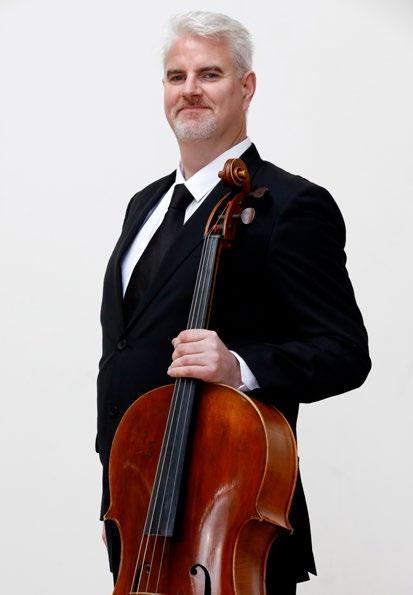
When did you join the National Symphony Orchestra?
October, 2000.
What do you enjoy most about being in the NSO?
The full force of the orchestra’s sound in major symphonic works like Richard Strauss’s Also Sprach Zarathustra and Eine Alpensinfonie.
Tell us your favourite NSO story/ memory so far.
Prokofiev’s famously difficult Sinfonia Concertante with Natalia Gutman – a former student of Rostropovich – some 10 years ago. She was 70-years-old at the time but played by heart including every nuance possible from utter brutality to the sublime.
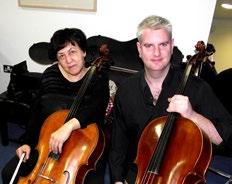
managed to persuade her to give me a lesson before the concert. It was conducted in German as she had almost no English and I have absolutely no Russian. She refused payment, but requested I drive her around Dublin on a sightseeing trip.
The concert was unbelievable, her performance really fresh as though it was her first outing with the piece. I often listen to the Prokofiev and reminisce about the week I got to meet my cello hero.
What are you most looking forward to in our 2024/25 season?
Richard Strauss’s Metamorphosen –music for the soul, simply impossible to play without giving every ounce of your being – and a visit from cello superstar Steven Isserlis for Haydn’s D major Concerto. Steven’s always inspiring, a story-teller of the highest calibre.
Do you have any secret talents? My undergraduate degree is Mechanical Engineering, not music. I like numbers.
If you could have dinner with anyone (alive or dead) who would it be, and why?
During rehearsals she would bark at the conductor in Russian whilst simultaneously hammering through the piece as though it was the easiest thing on earth to deliver. I really fell in love with her playing that day and
Felix Mendelssohn. He wrote so beautifully for the cello. I’d love to ask him why he didn’t write a concerto for us. Who knows how the repertoire might have developed if he had.
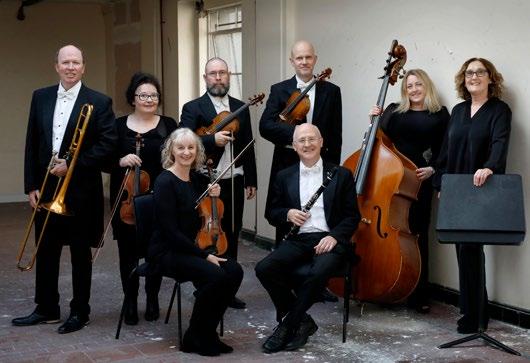

The National Symphony Orchestra has been at the centre of Ireland’s cultural life for over 75 years. Formerly the RTÉ National Symphony Orchestra, it was founded in 1948 as the Raidió Éireann Symphony Orchestra. In 2022, the Orchestra transferred from RTÉ to the remit of the National Concert Hall.
Resident orchestra of the National Concert Hall since its opening in 1981, it is a leading force in Irish musical life through year-long programmes of live music – ranging from symphonic, choral and operatic to music from stage and screen, popular and traditional music, and new commissions – alongside recordings, broadcasts on RTÉ and internationally through the European Broadcasting Union. Schools concerts, family events, initiatives for emerging artists and composers, collaborations with partner promoters and organisations extend the orchestra’s reach.
As a central part of the National Concert Hall’s 2024-2025 Season, the NSO presents more than 55 performances shared between Dublin, Galway, Limerick, Waterford and Cork. They include collaborations with international and Irish artists, ensembles and conductors – including a number of events with the National Concert Hall’s Artists-in-Residence: the renowned American musician and composer Bryce Dessner, the internationally acclaimed Irish mezzo-soprano Tara Erraught, and the dynamic musician and presenter Jessie Grimes. The programme is rich and varied, presenting repertoire from across the centuries to the present day including world and Irish premieres, choral masterpieces, birthday and anniversary celebrations, family concerts and screenings, schools concerts, and professional initiatives for emerging singers and composers. A focus on nature and the environment is a central part of the season’s programming.
Highlights with the Artists-in-Residence are many. They include three Irish premieres by Bryce Dessner: Mari , his Violin Concerto performed by its dedicatee, Pekka Kuusisto, and his Concerto for Two Pianos performed by Katia and Marielle Labèque, for whom it was written. Tara Erraught performs virtuosic works by Mozart, Haydn and Marianne von Martínez, with historical performance specialist Laurence Cummings conducting, and arias by Mozart, Puccini, Bellini, Donizetti and Rossini, with Clelia Cafiero conducting. Tara is also the driving
force behind Celebrating the Voice, a week-long professional development programme for young singers which culminates in an opera gala with the NSO conducted by Anu Tali. Jessie Grimes leads immersive, family-friendly concerts including Our Precious Planet and explorations of iconic works: Beethoven’s Fifth Symphony and Berlioz’s Symphonie fantastique as part of the ASD-friendly Symphony Shorts, as well as Prokofiev’s Peter and the Wolf, featuring new and specially commissioned shadow puppetry, and Britten’s The Young Person’s Guide to the Orchestra.
Other exciting highlights include Dame Sarah Connolly joining conductor Mihhail Gerts for Alma Mahler’s Six Songs; an 80th birthday celebration for conductor Leonard Slatkin which includes the world premiere of his son Daniel’ s cosmic journey, Voyager 130 ; Hugh Tinney performing Beethoven’s Fourth Piano Concerto; Speranza Scappucci conducting a Ravel Birthday Celebration; John Storgårds conducting Rachmaninov and Shostakovich; Anja Bihlmaier conducting Mahler’s Ninth Symphony; and Ryan McAdams conducting the First Violin Concerto by Philip Glass with NSO Leader Elaine Clark as soloist; and John Luther Adams’ Pulitzer Prize-winning Become Ocean. Jaime Martín returns to conduct Chopin’s Second Concerto with Yeol Eum Son as the soloist, and former Principal Conductor Gerhard Markson returns for Stanford’s Requiem featuring the National Symphony Chorus and soloists including Máire Flavin and Sharon Carty.
World premieres by Deirdre McKay and Ailís Ní Ríain and, as part of Composer Lab, by Amelia Clarkson, Finola Merivale, Barry O’Halpin, and Yue Song all feature. Irish premieres include a new orchestral setting of Philip Glass’s film score Naqoyqatsi with the Philip Glass Ensemble; Stephen McNeff’s The Celestial Stranger with Gavan Ring as soloist; James MacMillan’s St. John Passion with the National Symphony Chorus and Chamber Choir Ireland; and Ukrainian Victoria Vita Polevá’s Third Symphony.
Additional family events include popular screenings of classic children’s stories by Julia Donaldson and Axel Scheffler – Stick Man and The Snail and the Whale – and Roald Dahl’s Revolting Rhymes . Music in the Classroom returns with Junior Cycle and Leaving Certificate Music Guide events, and Musical Adventures for Primary School children.
1st Violin
Ingerine Dahl
David Routledge
Sebastian Liebig †
Orla Ní Bhraoin °
Catherine McCarthy
Ting Zhong Deng
David Clark
Anne Harte
Bróna Fitzgerald
Claudie Driesen
Karl Sweeney
Molly O’Shea
Oonagh Keogh
Cliodhna Ryan
2nd Violin
Djumash Poulsen
Elizabeth McLaren ‡
Joanne Fleming Campbell °
Rosalind Brown
Paul Fanning
Dara O’Connell
Melanie Cull
Evelyn McGrory
Elena Quinn
Magda Kowalska
Matthew Wylie
Emma Masterson
Viola
Philip Hall
Francis Harte °
Ruth Bebb
Neil Martin
Cliona O’Riordan
Margarete Clark
Nathan Sherman
Anthony Mulholland
Alison Comerford
Carla Vedres
Cello
Polly Ballard ‡
Violetta-Valerie Muth °
Michael Atkinson
Úna Ní Chanainn
Filip Szkopek
David McCann
Eva Richards
Austen Scully
Double Bass
Sebastian Pennar
Mark Jenkins ‡
Helen Morgan
Waldemar Kozak
Jenni Meade
Ria Nolan
Callum Cronin
Flute
Catriona Ryan •
Ríona Ó Duinnín ‡
Piccolo
Sinéad Farrell †
Oboe
Matthew Manning •
Sylvain Gnemmi ‡
Cor Anglais
Deborah Clifford †
Clarinet
Anna Hashimoto
Matthew Billing †
Bass Clarinet
Fintan Sutton †
Bassoon
Greg Crowley •
Andrew Huntriss
Contra Bassoon
Hilary Sheil †
Horn
Benjamin Hartnell-Booth
Peter Ryan
Bethan Watkeys †
David Atcheler ◊
Kiersten Gustafson
Trumpet
Darren Moore
Sam Lewis
Pamela Stainer
Eoghan Cooke
Trombone
Jason Sinclair •
Gavin Roche ‡
Bass Trombone
Josiah Walters †
Tuba
Francis Magee •
Timpani
Luke Taylor
Percussion
Rebecca Celebuski
Bernard Reilly ◊
Richard O’Donnell
Brian Dungan
John Rousseau
Harp
Andreja Malir •
Rhian Hanson
Dianne Marshall
Rosanna Moore
Piano
Fergal Caulfield
Celeste
Alison Thomas
• Section Leader
* Section Principal
† Principal
‡ Associate Principal
° String Sub Principal
◊ Sub Principal 1
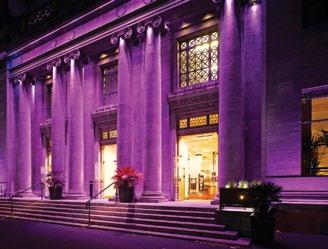
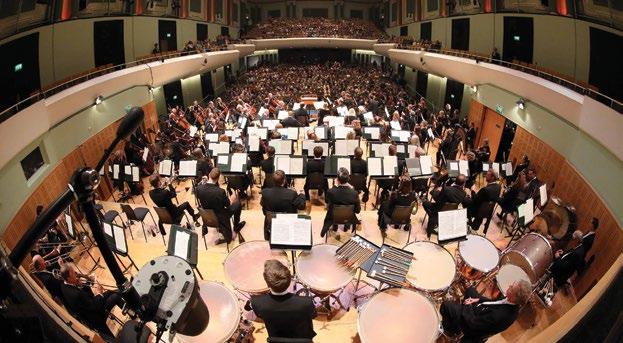
Go spreaga an ceol tú.
Bain sult as ceol binn sa Cheoláras Náisiúnta. Is leatsa an Ceol. Is leatsa an Ceoláras Náisiúnta. nch.ie
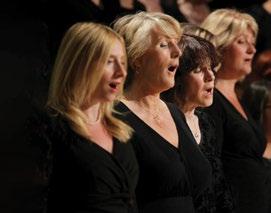











10 JANUARY 2025
NATIONAL CONCERT HALL , DUBLIN
NATIONAL SYMPHONY ORCHESTRA | STEFAN GEIGER conductor


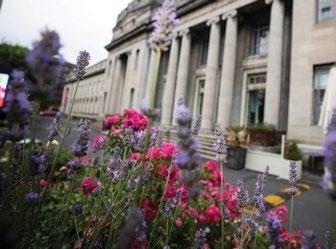
Explore the History and Legacy of Ireland’s Cultural Icon
From backstage areas to architectural details rarely seen by the public, this tour offers a unique opportunity to delve into the hidden corners and history of a building that has hosted some of Ireland’s greatest performances.
27 SEPTEMBER 2024
25 OCTOBER 2024
22 NOVEMBER 2024
10.30am
Tickets: €10
Spaces are limited
Booking advised
nch.ie
NATIONAL CONCERT HALL 2024 — 2025 SEASON

JUDITH RING EVERYTHING WAS ASLEEP AS IF THE UNIVERSE WAS A VAST MISTAKE
Friday 29 November 2024 (NCH)
Saturday 30 November 2024 (SETU Arena, Waterford)
STEPHEN MCNEFF THE CELESTIAL
STRANGER Irish Premiere
Friday 31 January 2025
AILÍS NÍ RÍAIN THE LAND GROWS
WEARY OF ITS OWN Irish Premiere
MAHLER DAS LIED VON DER ERDE
(THE SONG OF THE EARTH )
Friday 21 February 2025
BEETHOVEN SYMPHONY NO. 6, PASTORAL
Friday 21 March 2025
SIBELIUS THE OCEANIDES
Friday 9 May 2025
HAYDN THE CREATION
Friday 23 May 2025
Tickets from €15 nch.ie